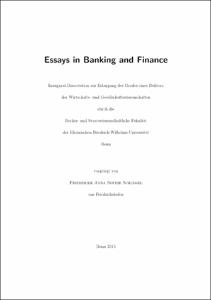Essays in Banking and Finance

Essays in Banking and Finance

| dc.contributor.advisor | Hakenes, Hendrik | |
| dc.contributor.author | Schlegel, Friederike Anna Sophie | |
| dc.date.accessioned | 2020-04-20T14:29:47Z | |
| dc.date.available | 2020-04-20T14:29:47Z | |
| dc.date.issued | 29.06.2015 | |
| dc.identifier.uri | https://hdl.handle.net/20.500.11811/6373 | |
| dc.description.abstract | This dissertation consists of three chapters covering the development and analysis of three self-standing theoretical models. They all take an informational economics view and analyze important topics related to banking and finance. The first chapter discusses crowdfunding as a tool to exploit the financial wisdom of the crowd whereas the last two chapters deal with informational problems leading to the financial crisis: the lack of early warnings and missing incentives for an improvement of risk models in banks. Crowdfunding has seen massive growth during the past few years. Under the crowdfunding concept, a firm asks for a large number of small loans from many households. However, if some predefined threshold for the aggregate loan volume is not attained, the firm cannot obtain the loans. We construct a model to determine whether this mechanism can be used to aggregate vague information from many households. In crowdfunding, from a welfare perspective, firms set both the loan rate and the threshold too low, inducing households to generate too much information. However, compared with standard debt financing, crowdfunding enables more worthy projects to receive funding. The severity of the recent financial crisis hit many by surprise. Despite warning signs, the financial system seems to have been unable to aggregate existing information. What triggers an early warning, and what are the incentives to implement such a trigger? In chapter two, a theoretical model is constructed to analyze this question and to show that a contract with insufficient incentives to communicate a warning might be implemented, as refinancing conditions deteriorate when lenders notice an upcoming crisis. We discuss policies to improve information efficiency and give conditions under which regulatory measures increase welfare. In the recent financial crisis, risk management tools have been proven inadequate. It seems that risk models did not cover the included risks comprehensively. But do banks have the incentive to improve their risk models? Chapter three takes a close look at those models and discusses if banks generally invest enough effort to improve their risk models. The question of risk model innovation is analyzed in the context of a principal agent model. | en |
| dc.language.iso | eng | |
| dc.rights | In Copyright | |
| dc.rights.uri | http://rightsstatements.org/vocab/InC/1.0/ | |
| dc.subject | Crowdfunding | |
| dc.subject | Wisdom of the Crowd | |
| dc.subject | Entrepreneurial Finance | |
| dc.subject | Information Efficiency | |
| dc.subject | Signaling | |
| dc.subject | Gatekeeper Function of Finance | |
| dc.subject | Banking Crises | |
| dc.subject | Information Propagation | |
| dc.subject | Incentives | |
| dc.subject | Compensation | |
| dc.subject | Regulation | |
| dc.subject | Model Risk | |
| dc.subject | Incentives | |
| dc.subject | Regulation | |
| dc.subject.ddc | 330 Wirtschaft | |
| dc.title | Essays in Banking and Finance | |
| dc.type | Dissertation oder Habilitation | |
| dc.publisher.name | Universitäts- und Landesbibliothek Bonn | |
| dc.publisher.location | Bonn | |
| dc.rights.accessRights | openAccess | |
| dc.identifier.urn | https://nbn-resolving.org/urn:nbn:de:hbz:5-40337 | |
| ulbbn.pubtype | Erstveröffentlichung | |
| ulbbnediss.affiliation.name | Rheinische Friedrich-Wilhelms-Universität Bonn | |
| ulbbnediss.affiliation.location | Bonn | |
| ulbbnediss.thesis.level | Dissertation | |
| ulbbnediss.dissID | 4033 | |
| ulbbnediss.date.accepted | 06.02.2015 | |
| ulbbnediss.institute | Rechts- und Staatswissenschaftliche Fakultät / Fachbereich Wirtschaftswissenschaften : Institut für Finanzmarktökonomie und Statistik (IFS) | |
| ulbbnediss.fakultaet | Rechts- und Staatswissenschaftliche Fakultät | |
| dc.contributor.coReferee | Haselmann, Rainer |
Dateien zu dieser Ressource
Das Dokument erscheint in:
-
E-Dissertationen (288)




